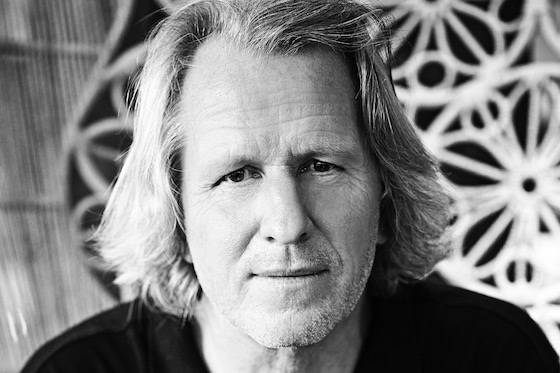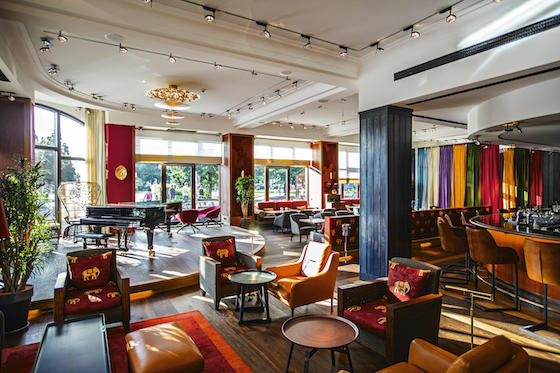A man whose claim to fame had been creating hotel software is today the talk of Berlin for creating and operating the Hotel Orania Berlin, which couldn’t be less focused on technology.
Dietmar Müller-Elmau, who sold Fidelio to Micros in 1995, has returned to his much more culturally minded roots, building hotels where guests can meet and stay among local artists, thinkers, philosophers and politicians.
His career as a true hotelier started in the late 1990s when he took over the family’s Schloss Elmau, located between Garmisch-Partenkirchen and Mittenwald in Germany’s Bavaria. The hotel for years had been known for being an artistic community before Müller-Elmau turned it into more of a luxury wellness center.

But as he hatched plans to grow his hotel portfolio, he says he knew discerning travelers wanted more than just good food and service and a nice place to stay. They wanted inspiration and to meet people of different mindsets – not like-minded travelers – a cultural hideaway in a capital of culture. “You go into a hotel or resort to start thinking, not to stop thinking – to start engaging,” he says.
So the 40-room Orania Berlin was created to house local artists and thought leaders who perform on the big “living room” stage and remain immersed in the guest experience because they live there while performing. They aren’t paid to perform or debate the issues of the day because they are locals who are inspired to be a part of the Müller-Elmau-designed hotel’s essence and experience. With a big restaurant and a great bar to boot, the results have been staggering, according to Müller-Elmau. “It’s food for thought, and maybe good for the soul,” he adds.
In fact, luxury- and culturally driven Orania has been in the headlines for standing out in a diverse neighborhood not known for luxury. Dissenters have tried to smash hotel windows, and the high-octane publicity questioning the politics of the hotel’s speakers and performers has been great for business. It also has inspired Müller-Elmau to look for more sites, and he is thinking about markets like New York, London and Tokyo, among others.
“We’ve been lucky because we provide so much content in our properties that we have a story to tell, and the story keeps on changing on a daily basis,” Müller-Elmau says. “It’s never the same story. It’s always something different every day because we manage content. So, content becomes essential to our relevance for a particular audience or customer base, and also for the media. And even though we have the content, we still have a challenge to reach out to the right media.”
He also believes the more the hotel links to society because of its engagement, the more chances it has to expand its audience. “This tiny hotel in Berlin, everybody in the city knows it after three months – every cab driver knows it because it’s in the news almost daily,” he adds. “There’s no hotel in Germany that has this kind of media attention, and it’s only because it’s also a political issue just not another hotel somewhere. So, we have to manage more than the others.”

The indie opportunity
With a family history in the business and his own career developing and selling hotel software, Müller-Elmau has developed his own set of guiding principles and shared his thoughts on what matters to him now and in the near term when it comes to succeeding as an owner-operator.
He likes to talk about architecture that celebrates diversity and not conformity. “We mix different materials from around the world – not just local, and it has a lot of contradiction,” Müller-Elmau says. “But that’s how it opens up the space and creates an atmosphere of an open society rather than of a closed community.”
Design’s impact on the guest, Müller-Elmau says, also helps his staff act differently as individuals and, as a result, friendlier because they, too, are not being homogenized. “We don’t standardize them, and try to treat staff as individuals and leave them as that, and we pay them well,” he says. “Hoteliers don’t pay enough, that’s one of the reasons why there’s a shortage because people are underpaid, and service is not as appreciated as it should be… In Berlin the rates are a quarter of what they are in London, and the quality of the product we offer is better than in London. This (low pay) is a major problem in Germany particularly, and that’s why you have so few really good 5-star hotels.”
Having not completely forgotten his technology-focused past, Müller-Elmau says hotel companies need to further remove the pain from the reservation process. “Make it as easy and as sexy as buying a record on iTunes,” he says. “And if you want to have a spa treatment or book a restaurant, you should be able to get it all in transaction. That’s what we’re working on, also… It’s an experience you’re buying, and the experience is far more than just the room, and that needs to be reflected in the booking engine.”
Finally, Müller-Elmau urges GMs to get out of their offices and budget meetings. “I don’t see anybody caring for the guests. I just see anonymous employees who say ‘yes’ or ‘no.’ We didn’t have a controller for the first 10 years in Bavaria. There’s just too much concentration on cost-cutting and efficiency, and there is not enough attention on service and marketing and guest attention. That’s the chance of the independent small hotel.”

